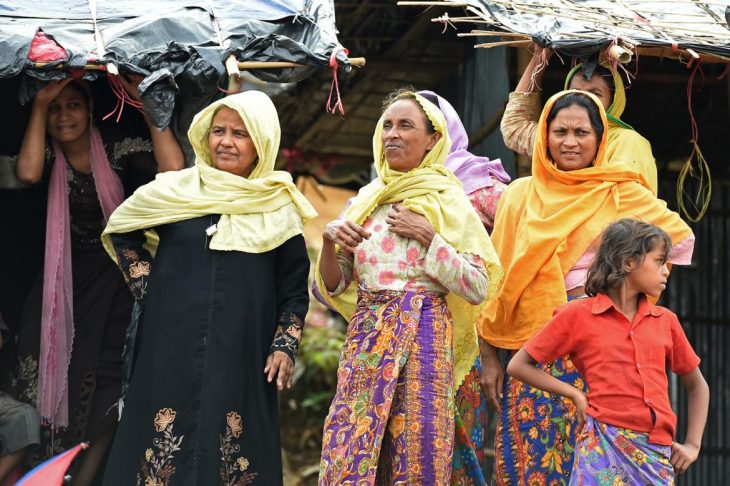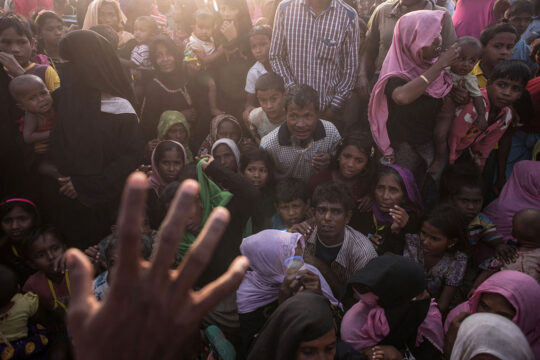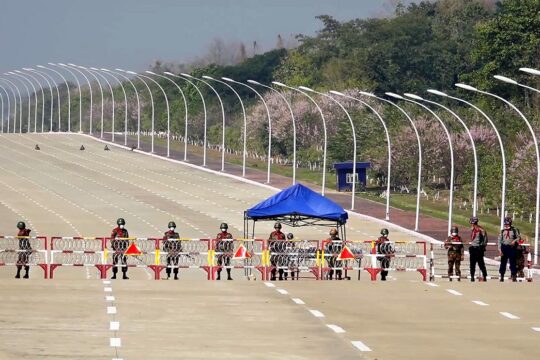Myanmar's government says it is ready to begin scrutinising refugees who have fled to Bangladesh in the wake of recent violence in northern Rakhine State – the first step on the path to potential repatriation.
Speaking to reporters in Nay Pyi Taw on Tuesday, government spokesperson U Zaw Htay said Myanmar is planning to begin the repatriation process as soon as possible.
However, in a sign of the tense state of relations between the neighbouring countries, Zaw Htay also accused Dhaka of dragging its feet on repatriation.
He said the government is concerned that Bangladesh has not agreed to repatriate refugees in accordance with a 1993 agreement. He refused to elaborate because the topic remains under discussion.
He suggested that Bangladesh was stalling in an effort to attract humanitarian aid.
“The reason for the delay is because Bangladesh has announced that it will build the biggest refugee camp in the world. And in Geneva, Switzerland, several hundred millions of dollars has been donated,” Zaw Htay said.
“Currently they [Bangladesh] have got nearly US$400 million. Over their receipt of this amount, we are now afraid of delaying the programme of deporting the refugees,” he said, adding that Myanmar was concerned that Bangladesh would have “another reason” for delaying the repatriation, without elaborating.
The United Nations on October 4 called for $434 million in aid to provide assistance to up to 1.2 million newly arrived and existing refugees until February 2018. On October 23, it announced that countries had pledged $344 million, but UN officials cautioned that these pledges needed to be followed up by real contributions.
Disagreement
Disagreement also emerged following the recent visit of Bangladesh’s Minister for Home Affairs Mr Asaduzzaman Khan.
Khan visited from October 23 to 25 to meet Myanmar officials for talks on the recent crisis, which has seen more than 600,000 people – mainly Muslims who identify as Rohingya – flee into southern Bangladesh, where they are staying in makeshift camps.
On October 26, Myanmar’s Ministry of Foreign Affairs published a statement saying that the two countries had reached a 10-point agreement that included halting the outflow of “Myanmar residents” to Bangladesh and restoring normalcy in northern Rakhine State.
By November, the countries agreed to finalise a bilateral agreement on the return of refugees and to form a joint working group with agreed terms of reference “to oversee all aspects of return”.
In a statement the same day, Bangladesh’s Ministry of Foreign Affairs acknowledged the 10 points but said that a version of a joint release agreed at the meeting and subsequently published by Myanmar had “deleted reference to the full implementation of the Kofi Annan Commission recommendations for sustainable return”.
One of the recommendations of the Kofi Annan commission – officially titled the Advisory Commission on Rakhine State – is that any returns or relocations are conducted in accordance with international standards.
However, in comments to Bangladesh media after the visit to Myanmar, Khan sought to play down the disagreement.
“They [Myanmar] didn’t differ on any matter. They just said they would take a decision after discussing the matter with the higher authorities. We had insisted that they should work on the basis of the Joint Working Group,” he was quoted as saying.
The violence in northern Rakhine State erupted on August 25 when the Arakan Rohingya Salvation Army launched surprise attacks on 30 police posts and a military camp.
Many refugees say they are fleeing violence at the hands of Myanmar’s military and local ethnic militia, with the Tatmadaw (national army) accused of using disproportionate force, including arson, mass rape and extrajudicial killing.
The Myanmar government and military have denied the accusations. Tens of thousands have protested around the country in support of the government and military, accusing the international community of interfering in domestic affairs.
This article was first published by Frontier





